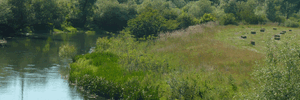„Our life insurance, our natural capital“
EU Biodiversity Strategy until 2020
„Let’s Live in Harmony with Nature!“
Strategic plan for Biodiversity 2011—2020
European Union funds constantly encourage the application of the policies in the field of environmental protection on regional level by providing the investments needed for better management, protection and control. The major means of financing relate to the regional development and the common agricultural policy while directing the investments towards overcoming the existing environmental issues brought about by human activity and climate changes such as:
- Extreme floods and draughts
- Extinction of species
- Exhaustion of natural resources
- Pollution
- Desertification
During the first period of Bulgaria’s EU membership, the Regional Inspectorate for Environment and Waters in Veliko Tarnovo in partnership with public authorities, academic circles, businesses and civil society, as well as with the financial support extended by European Regional Development Fund implemented two projects that provided solutions for better life. The projects were as follows:
- The Strategic project „Joint Risk Monitoring during Emergencies in the Danube Area Border“, reference number № 2s-2.2-1, MIS-ETC Code: 166, acronym RISK, implemented under Crossborder Cooperation Programme Romania-Bulgaria 2007-2013, with an investment capacity of 400 000 euro to combat emergencies and accidental pollutions of the environment and to intervene in order to provide prevention, monitoring and control in the Bulgarian share of the Low Danube river in compliance with the standards and procedures established by European Union.
- The project “Structure and management of nature reserves Haidushki chukar and Savchov chayr”, № DIR-5113325-9-105 under Operational programme Environment 2007 – 2013 г. with a capacity for investments at the amount of up to 304 900 levs for protection and restoration of the biological diversity by implementing activities related to structuring and management of reserves under Procedure BG161PO005/11/3/3.2/05/26.
The project RISK enhances the capacity of the regional inspectorate for exerting yet more adequate control over industry in relation to the application of the respective laws while offering solutions about the preparatory actions, prevention and timely reaction to natural and anthropogenic risk in response to the growing tendency for manifestation of dangerous to human health and the environment (water, air, soils, biodiversity) processes and events connected with climate changes (see Ekologia magazine, 3/2012 and 1-2 / 2014). On the basis of the achievements made so far and in order to upgrade the current outcomes by introducing new partnership initiatives during the second planning period 2014-2020 of Bulgaria and Romania EU membership, in Veliko Tarnovo was signed An Agreement for cooperation in environmental protection, encouragement of adaptation to climate changes, risk management and risk prevention in the Danube river cross-border area. The parties to the abovementioned agreement are the Regional Inspectorate for Environment and Waters in Veliko Tarnovo, the National Environmental Guard of Romania, ICMET – Research-Development and Testing National Institute for Electrical Engineering – Craiova, Romania and the non-governmental organization “Partners for Sustainable Development” from Veliko Tarnovo.
Being aware of the necessity for common actions in relation to the protection of the population and the environment, and taking into account the strategy of the European Union “Europe 2020” for smart, sustainable and inclusive growth, the Danube river strategy, the Seventh EU action programme for the environment until 2020 „Well-being on our planet“ as well as the first complete version of the Cross border Cooperation Programme Romania-Bulgaria 2007-2013, the partners undertake to collaborate, bringing public, environmental and health benefits to local communities by common solutions for enhancing the quality of air and waters in the Low Danube river basin, prevention of pollution, improvement in the monitoring and control of the environment. The steps determined to prevent industrial pollution come as a result of the experience accumulated and the discussions held among partners and offer solutions for the following:
- Restriction of the industrial pollution by exerting strict control and imposing penalties
- Introduction of stimuli for industries which apply the internationally recognized certification system for environmental protection
- Reliable and timely monitoring of polluted sites and objects
- Development and strict control over the implementation of effective plans for restricting the consequences and harmful effect brought about by industrial accidents and hazards where environmental components have been polluted
- Support and encouragement of the design of efficient technologies to help decrease the consumption of raw material and creation of environmentally friendly products
“The prevention of flood risk is a priority before the Ministry of Environment and Waters”, declares the Minister of Environment and Waters Ms. Ivelina Vasileva. The measures to help decrease the risk of floods must focus on:
- Assessment of the state of the protective embankments and other safety constructions as well as the necessity for building new ones in the urbanized areas
- Identification of the exposed to flooding riverbanks and assessment of risk from overflow
- Prevention and protection against floods by regular maintenance of the protective constructions and clear up of riverbeds
- enhancement of the monitoring networks and development of early warning systems
- strengthening the coordination among all institutions in relation to water management in instances of flooding, training of the population for the actions to be taken in emergency situations and increasing the participation of citizens.
Measures for restricting the harmful impact of climate changes and adapting to the already changed climate will be directed to taking actions for:
- strict control over businesses observing their obligations as defined in the relevant European and national laws
- promotion of the major benefits to industries from introduction of innovative solutions, which lead to reduction of greenhouse gas emissions
- support for the design and introduction of highly effective low carbon technologies and development of green economy
- encouragement of the introduction of new technologies for production of energy from renewable energy sources suitable to be implemented in this region of our country and which do not bring forth environmental conflicts
- improvement of public awareness of citizens in relation to the issues raised by climate changes and the necessary steps which everyone must take in order to benefit both people and the environment.
The project “Structure and Management of Byala Krava nature reserve and maintained reserves Haidushki chukar and Savchov Chayr”, implemented under Operational Programme “Environment 2007-2013” is dedicated to the protection, restoration and support of the sustainable management of biological species and natural habitats which fall into the national network of protected areas and zones NATURA 2000. The activities under the project are merged into four modules as follows:
|
1.1. Development of management plan for Byala Krava reserve. 1.2. Updating the management plan for Savchov chayr reserve. 1.3. Compiling an inventory list of forests in the maintained nature reserve Haidushki chukar. 1.4. Designing fire safety plans for the three reserves. |
|
2.1. Design and placing of 12 information boards at the borderlines of the reserves and the villages located in their close proximity Kostel, Buinovtsi, Voinezha, Kladni dyal 2.2. Marking the borderline for the three reserves 2.3. Marking the visitors path in the maintained reserve Savchov chayr as the path has been determined by a decree issued by the Minister of Environment and Waters 2.4. Placement of two warning signs along the ridge route passing near the borderline of maintained reserve Haidushki chukar. |
|
3.1. Design, printing and distribution of promotional and information materials: – Book, posters, leaflets – Topical maps of the three reserves – Brochure and cards to present the reserves and the policy for their management in public campaigns, exhibitions etc. 3.2. Educational pack – design, print and distribution |
|
4.1. Gathering project team 4.2. Organisation and implementation of activities 4.3. Providing information and publicity for the project 4.4. Audit of the project |
The expected results from the implementation of the project are:
- Development of plans for sustainable management of the three natural reserves
- Enhanced conditions of use of natural resources for the purposes of ecological tourism and ecologically-oriented education and training of young people
- Increased public awareness regarding biological diversity and the natural reserves situated on the territory of RIEW Veliko Tarnovo
In the context of the goals of the operational programme, the project contributes to the protection and sustainable use of common legacy and natural resources by strengthening the integrated approach to trigger the mutually beneficial interaction and partnership and achieve sustainable development in the region of Veliko Tarnovo.
In the period 2009-2014 RIEW Veliko Tarnovo built a capacity which can be utilized in the new programme period to implement both European and national environmental policies and provide measures with funds from European Union by designing and completing projects under operational, cross-border and transnational programmes. An important role in supporting the efforts on regional level will be assigned to the fast and timely introduction of the necessary changes in laws and the launching of completely novel management practices in a variety of sectors. The solutions and actions for protection, preservation and increase of natural capital, the protection of civilians from related to the environment impact and risk to their health and well-being, the provision of investments in the field of environmental protection and climate, the enhancing of the sustainability of both towns and villages, the better integration of environmentally related issues into sector policies as well as the improved coordination in their application will help increase the efficiency of RIEW Veliko Tarnovo in dealing with challenges posed on both regional and local level and related to the environment, climate changes and sustainable development.
Kameliya Dzhanabetska
project manager














